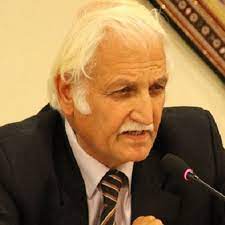Amendment Bill will not end menace of enforced disappearances: Farhatullah Babar

Islamabad: Farhatullah Babar secretary general of the Pakistan People’s Party Parliamentarians said Thursday that on June 7 about twenty legislative items were listed on the Orders of the National Assembly including the one on enforced disappearances.
“In the din of noise over the legislation for electronic voting machines (EVMs) an amendment Bill introduced by the interior minister escaped public attention and scrutiny,” he said.
He added: “The amendment Bill sought to amend some provisions of the Pakistan Penal code and the Code of Criminal Procedure. No speeches were made as it was quickly referred to the relevant committee. As a result it escaped media and public attention as it lay buried in the pile of legislative agenda.”
He said the “amendment Bill acknowledges the crime of enforced disappearance and defines it as “an unlawful or illegal deprivation of liberty by an agent of the state. However the absence of clarification about the mandate of the agencies, allegedly behind the crime has made it gravely problematic.”
Babar said this clarification is critical as during hearings in cases of enforced disappearances before superior courts the ISI claimed to have ‘lawful’ authority to arrest persons engaged in anti-state activities even though there is no legislation about it. It therefore remains a grey area that allows state agencies to cover up enforced disappearances.
“Enforced Disappearances must be treated as a separate autonomous crime. A separate legal mechanism needs to be provided for taking up complaints, holding perpetrators accountable and providing for compensation to the aggrieved families. The amendment Bill does not meet these requirements,” he said.
He added: “In mid 1960’s a military dictator made an amendment 2 (1) (d) in the Army Act to give powers to the army to investigate and try in military courts even civilians in some cases. Such a law does not exist even in India and Israel.”
The PPP leader said: “The PPP cautions against rushing through the bill. It also demands that all stakeholders be invited to discussions in the relevant committee or to public hearings if they are held as provided in the rules of the Parliament”.





